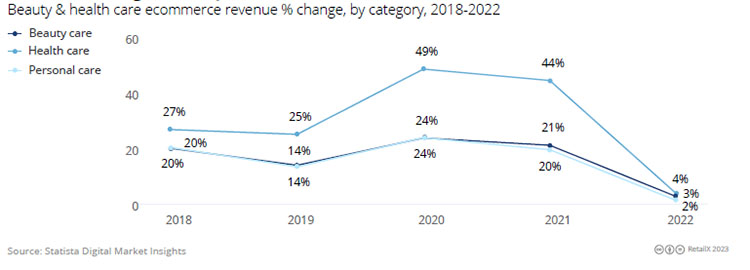Consumers are now increasingly shopping online to find cheaper health and beauty products as the ongoing cost-of-living crisis drives shoppers away from preferred brands. The survey of UK consumers highlighted that more than a third (38%) were more likely to shop online for personal care products than they were before the pandemic, and the main reason was to find the lowest cost.
The findings come from CommerceHub, one of the world’s largest commerce networks and owners of ChannelAdvisor, which conducted a survey of UK consumers’ spending habits in the personal care sector. The research highlighted that two in five were spending more on personal care products per month and 12% of respondents had noticed a significant increase in costs, due to the cost of living crisis.
Price comparison was the top priority when shopping online, with over half (55%) choosing to buy online due to the ability to compare prices and sizes. Consumers are now prioritising price over factors such as the quality of the products. Ethical considerations were much lower on the priority list for consumers with less than a third (30%) shopping for cruelty free products and fewer than one in five (18%) interested in sustainable packaging.
Nearly two out of five (38%) said they would order a health and beauty product online that they hadn’t tried before, but only if it was cheaper than their usual brand. Price was even more important than recommendations from a friend which influenced under a third (30%) of those surveyed.
Millennials were found to be the highest spenders in this sector, with shoppers in the 25-34 age bracket spending the most per month on personal care products (an average of £50.26) compared to an average of £34.42 across all age groups. Of this age bracket 47% now buy more online than before the pandemic, showing the increase in popularity of ecommerce in the health and beauty sector.
This is really interesting, as our Health and Beauty Marketplaces Sector Report found that after years of double digit growth, beauty & health care categories slowed down online sales significantly in 2022. Was this a post pandemic shift back to stores which is now being reversed, driven by the current cost of living crisis?

With new marketplaces such as Boots and Superdrug having recently launched, they are likely to benefit from a return to online shopping for health and beauty products with the double benefit of carrying a wider range from their third party retailers giving consumers access to health and beauty product online that they perhaps haven’t tried before and a wider range of price points to choose from.
You can download the full RetailX 2023 Health and Beauty Marketplaces Sector Report here.
In the competitive health and beauty space, getting online strategies right will be crucial for a brand’s sustainable, profitable growth. After the important work to get products online quickly to meet demand throughout the pandemic, we are now working with companies to focus on the next steps for their ecommerce strategy. We’re looking at channel mix and infrastructure to ensure that they are positioned for the future with the agility needed to adapt to ever-changing market conditions.
With more time to research product information, investigate ingredients and watch online tutorials from beauty bloggers, the pandemic created a shift in the personal care sector, establishing online as a key selling channel. While there has been some reverting to the high-street, it appears ecommerce is going to be a crucial part of the sector going forward and retailers and brands can no longer ignore the ecommerce space as the fight for profitability continues.
Despite economic challenges, there are still opportunities for those who get their proposition right. A growing number of brands have been exploring direct-to-consumer strategies, strengthening their social media presence, and enhancing their omnichannel capabilities. However, in such a competitive space, ensuring product visibility through smart online advertising is key and building a strong retail media strategy is crucial.
– Vladi Shlesman, managing director for EMEA, ChannelAdvisor – a CommerceHub company









